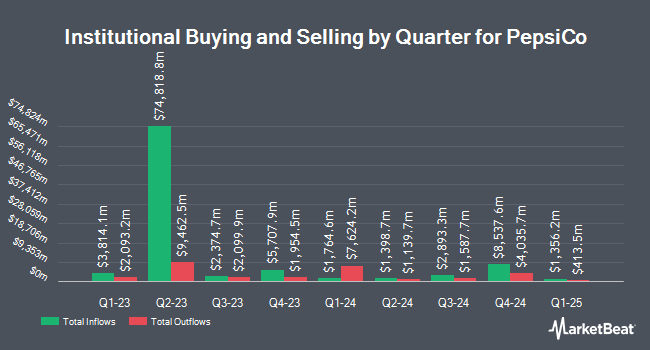Bradley Foster & Sargent Inc. CT decreased its stake in PepsiCo, Inc. (NASDAQ:PEP - Free Report) by 2.5% in the 4th quarter, according to its most recent 13F filing with the Securities and Exchange Commission (SEC). The institutional investor owned 526,858 shares of the company's stock after selling 13,551 shares during the period. PepsiCo accounts for approximately 1.3% of Bradley Foster & Sargent Inc. CT's holdings, making the stock its 18th largest position. Bradley Foster & Sargent Inc. CT's holdings in PepsiCo were worth $80,114,000 as of its most recent SEC filing.
Other hedge funds and other institutional investors have also modified their holdings of the company. Cross Staff Investments Inc lifted its stake in PepsiCo by 0.9% in the third quarter. Cross Staff Investments Inc now owns 7,080 shares of the company's stock valued at $1,204,000 after acquiring an additional 60 shares during the last quarter. Paulson Wealth Management Inc. grew its holdings in PepsiCo by 2.1% during the third quarter. Paulson Wealth Management Inc. now owns 2,986 shares of the company's stock worth $508,000 after purchasing an additional 60 shares during the period. LCM Capital Management Inc increased its position in PepsiCo by 0.8% during the third quarter. LCM Capital Management Inc now owns 7,573 shares of the company's stock worth $1,288,000 after buying an additional 62 shares during the last quarter. Demars Financial Group LLC raised its stake in PepsiCo by 1.1% in the third quarter. Demars Financial Group LLC now owns 5,721 shares of the company's stock valued at $973,000 after buying an additional 62 shares during the period. Finally, Sigma Investment Counselors Inc. lifted its position in shares of PepsiCo by 1.6% in the third quarter. Sigma Investment Counselors Inc. now owns 4,310 shares of the company's stock valued at $733,000 after buying an additional 66 shares during the last quarter. Institutional investors and hedge funds own 73.07% of the company's stock.
Analyst Upgrades and Downgrades
PEP has been the topic of a number of recent analyst reports. Royal Bank of Canada started coverage on PepsiCo in a report on Tuesday, February 4th. They set a $172.00 target price on the stock. HSBC dropped their price objective on shares of PepsiCo from $186.00 to $170.00 and set a "hold" rating on the stock in a research report on Tuesday, February 4th. BNP Paribas reduced their target price on shares of PepsiCo from $162.00 to $160.00 and set a "neutral" rating for the company in a report on Tuesday, February 4th. Morgan Stanley lowered their price target on shares of PepsiCo from $185.00 to $168.00 and set an "equal weight" rating on the stock in a report on Wednesday, February 5th. Finally, Deutsche Bank Aktiengesellschaft reduced their price objective on PepsiCo from $184.00 to $178.00 and set a "buy" rating for the company in a report on Wednesday, January 22nd. One equities research analyst has rated the stock with a sell rating, twelve have issued a hold rating and eight have given a buy rating to the company. According to MarketBeat, PepsiCo currently has a consensus rating of "Hold" and a consensus price target of $171.47.
Check Out Our Latest Stock Analysis on PepsiCo
PepsiCo Price Performance
PEP stock traded up $4.40 during mid-day trading on Friday, hitting $153.50. The stock had a trading volume of 10,586,982 shares, compared to its average volume of 6,999,466. The firm has a fifty day simple moving average of $148.75 and a 200 day simple moving average of $162.39. The company has a current ratio of 0.82, a quick ratio of 0.65 and a debt-to-equity ratio of 2.05. PepsiCo, Inc. has a 52 week low of $141.51 and a 52 week high of $183.41. The firm has a market capitalization of $210.53 billion, a P/E ratio of 22.09, a P/E/G ratio of 3.02 and a beta of 0.54.
PepsiCo (NASDAQ:PEP - Get Free Report) last released its quarterly earnings data on Tuesday, February 4th. The company reported $1.96 earnings per share for the quarter, beating the consensus estimate of $1.94 by $0.02. The business had revenue of $27.78 billion for the quarter, compared to analyst estimates of $27.89 billion. PepsiCo had a return on equity of 58.87% and a net margin of 10.43%. PepsiCo's revenue was down .2% compared to the same quarter last year. During the same period last year, the firm posted $1.78 earnings per share. As a group, research analysts forecast that PepsiCo, Inc. will post 8.31 EPS for the current year.
PepsiCo Dividend Announcement
The business also recently announced a quarterly dividend, which will be paid on Monday, March 31st. Shareholders of record on Friday, March 7th will be given a $1.355 dividend. The ex-dividend date is Friday, March 7th. This represents a $5.42 dividend on an annualized basis and a yield of 3.53%. PepsiCo's dividend payout ratio is currently 77.99%.
PepsiCo Profile
(
Free Report)
PepsiCo, Inc engages in the manufacture, marketing, distribution, and sale of various beverages and convenient foods worldwide. The company operates through seven segments: Frito-Lay North America; Quaker Foods North America; PepsiCo Beverages North America; Latin America; Europe; Africa, Middle East and South Asia; and Asia Pacific, Australia and New Zealand and China Region.
See Also

Before you consider PepsiCo, you'll want to hear this.
MarketBeat keeps track of Wall Street's top-rated and best performing research analysts and the stocks they recommend to their clients on a daily basis. MarketBeat has identified the five stocks that top analysts are quietly whispering to their clients to buy now before the broader market catches on... and PepsiCo wasn't on the list.
While PepsiCo currently has a "Hold" rating among analysts, top-rated analysts believe these five stocks are better buys.
View The Five Stocks Here
Discover the 10 Best High-Yield Dividend Stocks for 2025 and secure reliable income in uncertain markets. Download the report now to identify top dividend payers and avoid common yield traps.
Get This Free Report
Like this article? Share it with a colleague.
Link copied to clipboard.